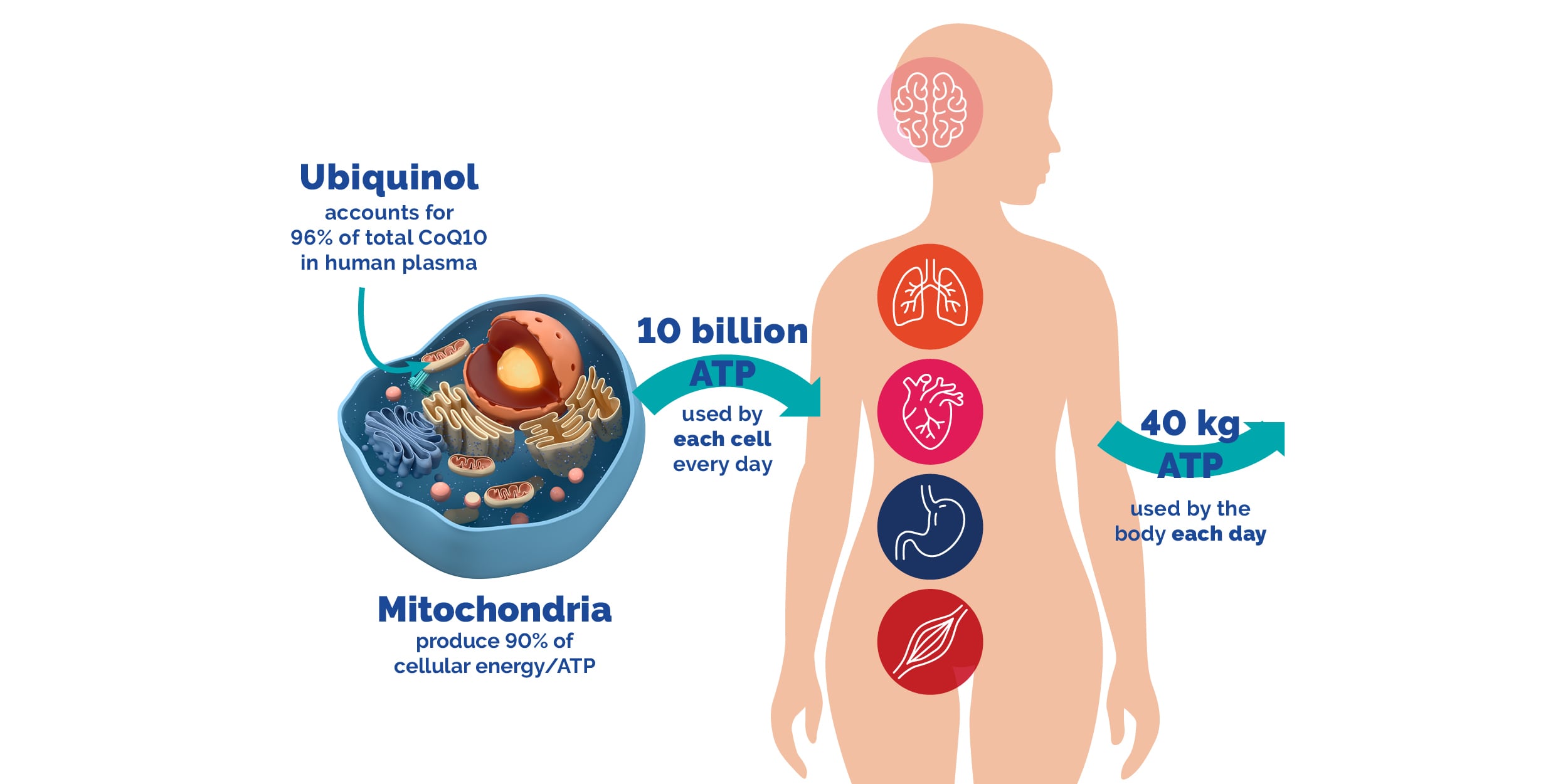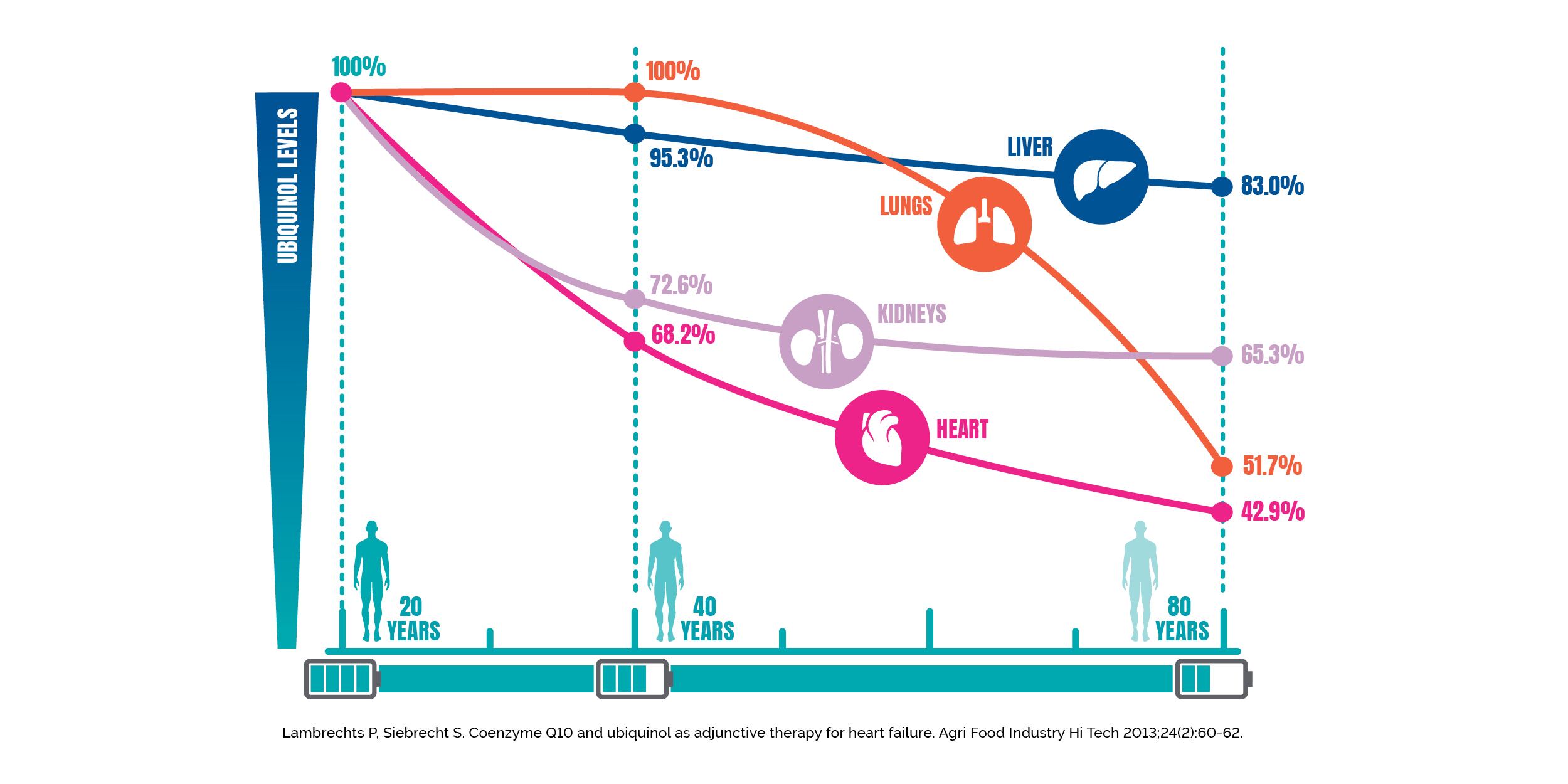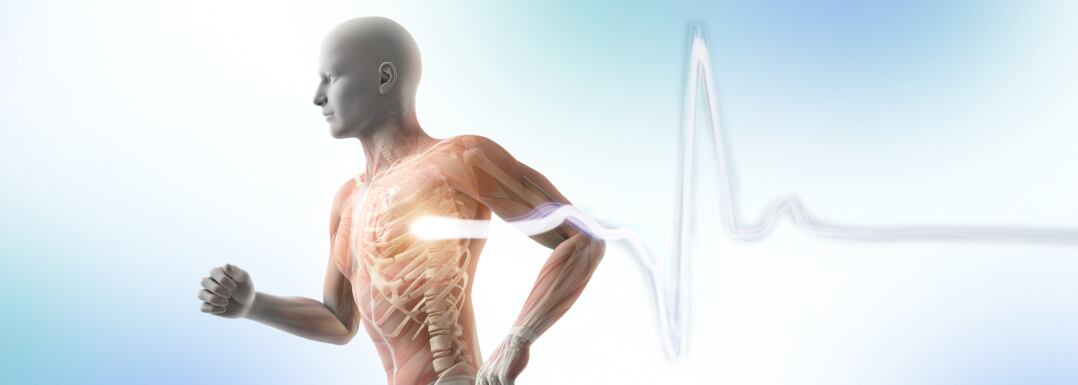For many consumers, taking control of their health through balanced nutrition, exercise and effective supplementation is a key priority.
This is especially as the demands of modern life and ageing start to impact energy levels, cognitive function and overall vitality.
Understanding how the body’s cells function, and the role of key nutrients, is essential. Every day, the human body produces and uses vast amounts of energy – powered largely by mitochondria, the energy centres of our cells.
The average cell in the human body is estimated to use 10 billion adenosine triphosphate (ATP) molecules daily, which translates to the body consuming 40 kg of ATP daily.1,2
Of this amount, the mitochondria generate around 90% of the biochemical energy necessary for cell survival.3

Ubiquinol plays a vital role in mitochondrial function and is crucial for all human tissues and organ health.4 It contributes to overall health and wellbeing by supporting cardiovascular and cognitive health, energy levels, menopause, fertility and healthy ageing.
What makes ubiquinol unique is that it is the only lipid-soluble antioxidant synthesised naturally within human cells. Due to its redox properties, ubiquinol acts as a powerful antioxidant and scavenger of free radicals.5
It protects membrane phospholipids from peroxidation and safeguards mitochondrial DNA and membrane proteins from oxidative damage caused by free radicals, thereby reducing the risk of cellular damage and cell death.6,7 Ubiquinol further aids in regenerating other antioxidants, including vitamins C and E.8
A decline in ubiquinol levels can significantly affect metabolic regulation, brain function, immunity, and inflammatory pathways, linking it to the development of various disorders.9-15
Understanding mitochondria
Mitochondria are complex organelles found in large numbers within all body cells. They are responsible for producing ATP, the cell's energy currency, through the Krebs cycle (cellular respiration). Ubiquinol plays a critical role in facilitating this energy production as part of the electron transport chain (ETC) in the mitochondrial membrane.
Beyond energy production, mitochondria are involved in essential cellular processes such as calcium storage, iron homeostasis, hormone and neurotransmitter production, regulation of apoptosis, and modulation of immune responses.8,16
Factors affecting ubiquinol production
Ubiquinol production naturally decreases with age and prolonged stress, whether from lifestyle, diet, or environmental factors.8,17-20 The body's capacity to convert the oxidised form of coenzyme Q10 (CoQ10), ubiquinone, to its reduced active form, ubiquinol, also diminishes over time. This decline starts around age 20, and, by age 80 myocardial ubiquinol levels may drop by about 50%.20-22
This reduction in production and conversion is thought to contribute to age-related decreases in cellular energy production and function, as well as increased oxidative damage and diminished antioxidant protection.23
Consumers can help maintain their natural ubiquinol levels with supplementation. Research has shown that ubiquinol supplements are effective in addressing a range of conditions including fatigue, fertility support, migraines, cognitive health and cardiovascular support. 24-34

Market opportunities: Ubiquinol supplementation
- Proven benefits Research supports the therapeutic advantages of supplementing with Kaneka Ubiquinol™.18-37
- Natural and well-tolerated Ubiquinol occurs naturally in the human body, and the stable, chemically identical Kaneka Ubiquinol is well-tolerated:38,39
- Safety first There have been no significant adverse effects reported from oral supplementation at doses as high as 3000 mg/day for up to 8 months, 1200 mg/day for up to 16 months, and 600 mg/day for up to 30 months.
- Strong safety evidence According to the Observed Safe Level (OSL) risk assessment method, doses up to 1200 mg/day of ubiquinol have strong evidence of safety.
- Industry recognition Kaneka Ubiquinol is the winner of the Healthy Ageing Ingredient of the Year Award 2024, NutraIngredients-Asia Awards.
Scientifically validated ubiquinol
Kaneka Corporation is the exclusive global supplier of Kaneka Ubiquinol, a powerful antioxidant produced through a patented yeast fermentation process using precise Japanese manufacturing techniques.
Backed by over 100 scientific studies, 45 years of research, and more than 80 patents, Kaneka Ubiquinol is recognised for its benefits in cardiovascular health, fertility support, energy production and mitochondrial health. It is constituting more than 96% of the total CoQ10 present in human plasma.
Kaneka upholds the highest standards based on the Japanese philosophy of 'Kaizen', which emphasises a commitment to quality, efficiency, and the pursuit of perfection. This philosophy is reflected in the company's rigorous quality control, extensive research efforts, and exceptional stakeholder support.
For consumers seeking to optimise their health, supplementing with Kaneka Ubiquinol offers a scientifically-backed solution for supporting healthy ageing, helping consumers feel their best as they embrace the years ahead.
Find out more information about ubiquinol or email via hello@ubiquinol.net.au.
*Always read the label and follow the directions for use. Consult your healthcare professional to establish if ubiquinol is suitable for your needs.
References
1. Pizzorno J. Mitochondria-Fundamental to Life and Health. Integr Med (Encinitas). 2014 Apr;13(2):8-15. PMID: 26770084; PMCID: PMC4684129.
2. Neupane, P., Bhuju, S., Thapa, N., et al. (2019). ATP Synthase: Structure, Function and Inhibition. Biomolecular concepts, 10(1), 1–10.
3. Carvajal, K., & Moreno-Sánchez, R. (2003). Heart metabolic disturbances in cardiovascular diseases. Archives of medical research, 34(2), 89–99.
4. Saini R. Coenzyme Q10: The essential nutrient. J Pharm Bioallied Sci. 2011 Jul;3(3):466-7.
5. Molyneux SL, Young JM, Florkowski CM, et al. Coenzyme Q10: is there a clinical role and a case for measurement? Clin Biochem Rev. 2008 May;29(2):71-82.
6. Groneberg, D. A., Kindermann, B., Althammer, M., et al. (2005). Coenzyme Q10 affects expression of genes involved in cell signalling, metabolism and transport in human CaCo-2 cells. The international journal of biochemistry & cell biology, 37(6), 1208–1218.
7. Cirilli I, Damiani E, Dludla PV, et al. Role of Coenzyme Q10 in Health and Disease: An Update on the Last 10 Years (2010-2020). Antioxidants (Basel). 2021 Aug 23;10(8):1325.
8. Schirrmacher V. Mitochondria at Work: New Insights into Regulation and Dysregulation of Cellular Energy Supply and Metabolism. Biomedicines. 2020 Nov 22;8(11):526.
9. Hernández-Camacho JD, Bernier M, López-Lluch G, et al. Coenzyme Q10 Supplementation in Aging and Disease. Front Physiol. 2018 Feb 5;9:44.
10. Gutierrez-Mariscal FM, Arenas-de Larriva AP, Limia-Perez L, et al. Coenzyme Q10 Supplementation for the Reduction of Oxidative Stress: Clinical Implications in the Treatment of Chronic Diseases. Int J Mol Sci. 2020 Oct 23;21(21):7870.
11. Hargreaves I, Heaton RA, Mantle D. Disorders of Human Coenzyme Q10 Metabolism: An Overview. Int J Mol Sci. 2020 Sep 13;21(18):6695.
12. Rodríguez-Cano, A. M., Calzada-Mendoza, C. C., Estrada-Gutierrez, G., Mendoza-Ortega, J. A., & Perichart-Perera, O. (2020). Nutrients, Mitochondrial Function, and Perinatal Health. Nutrients, 12(7), 2166.
13. Rodick TC, et al. Potential role of coenzyme Q10 in health and disease conditions. Nutrition Dietary Supp 2018;10:1-11.
14. Annesley, S. J., & Fisher, P. R. (2019). Mitochondria in Health and Disease. Cells, 8(7), 680.
15. Khacho, M., Harris, R., & Slack, R. S. (2019). Mitochondria as central regulators of neural stem cell fate and cognitive function. Nature reviews. Neuroscience, 20(1), 34–48.
16. Casanova, A., Wevers, A., Navarro-Ledesma, S., et al. (2023). Mitochondria: It is all about energy. Frontiers in physiology, 14, 1114231.
17. Varela-López A, Giampieri F, Battino M, et al. Coenzyme Q and Its Role in the Dietary Therapy against Aging. Molecules. 2016 Mar 18;21(3):373.
18. Kontush, A., Schippling, S., Spranger, T., et al. (1999). Plasma ubiquinol-10 as a marker for disease: is the assay worthwhile?. BioFactors (Oxford, England), 9(2-4), 225–229.
19. Yamamoto, Y., & Yamashita, S. (1999). Plasma ubiquinone to ubiquinol ratio in patients with hepatitis, cirrhosis, and hepatoma, and in patients treated with percutaneous transluminal coronary reperfusion. BioFactors (Oxford, England), 9(2-4), 241–246.
20. Wada, H., Goto, H., Hagiwara, S., et al. (2007). Redox status of coenzyme Q10 is associated with chronological age. Journal of the American Geriatrics Society, 55(7), 1141–1142.
21. Aaseth, J., Alexander, J., & Alehagen, U. (2021). Coenzyme Q10 supplementation - In ageing and disease. Mechanisms of ageing and development, 197, 111521.
22. Mantle, D., Heaton, R. A., & Hargreaves, I. P. (2021). Coenzyme Q10, Ageing and the Nervous System: An Overview. Antioxidants (Basel, Switzerland), 11(1), 2.
23. Soni A, et al. Coenzyme Q10 therapy in current clinical practice. Intern J Res Med Sci 2015;3(4):817.
24. Skarlovnik, A., Janić, M., Lunder, M., et al. (2014). Coenzyme Q10 supplementation decreases statin-related mild-to-moderate muscle symptoms: a randomized clinical study. Medical science monitor : international medical journal of experimental and clinical research, 20, 2183–2188.
25. Rabanal-Ruiz, Y., Llanos-González, E., & Alcain, F. J. (2021). The Use of Coenzyme Q10 in Cardiovascular Diseases. Antioxidants (Basel, Switzerland), 10(5), 755.
26. Gao, L., Mao, Q., Cao, J., et al. (2012). Effects of coenzyme Q10 on vascular endothelial function in humans: a meta-analysis of randomized controlled trials. Atherosclerosis, 221(2), 311–316.
27. Sabbatinelli, J., Orlando, P., Galeazzi, R., et al. (2020). Ubiquinol Ameliorates Endothelial Dysfunction in Subjects with Mild-to-Moderate Dyslipidemia: A Randomized Clinical Trial. Nutrients, 12(4), 1098.
28. Mizuno, K., Sasaki, A. T., Watanabe, K., et al. (2020). Ubiquinol-10 Intake Is Effective in Relieving Mild Fatigue in Healthy Individuals. Nutrients, 12(6), 1640.
29. Kunching S, et al. The effects of ubiquinol supplementation on clinical parameters and physical performance of trained men. Songklanakarin J Sci Technol 2022;44(1):231-235.
30. Safarinejad, M. R., Safarinejad, S., Shafiei, N., et al. (2012). Effects of the reduced form of coenzyme Q10 (ubiquinol) on semen parameters in men with idiopathic infertility: a double-blind, placebo controlled, randomized study. The Journal of urology, 188(2), 526–531.
31. Thakur AS, Littaru GP, Funahashi I, et al. Effect of Ubiquinol on Serum Reproductive Hormones of Amenorrhic Patients. Indian J Clin Biochem. 2016 Jul;31(3):342-8.
32. Sumbalová Z, Kucharská J, Rausová Z., et al. Reduced platelet mitochondrial respiration and oxidative phosphorylation in patients with post COVID-19 syndrome are regenerated after spa rehabilitation and targeted ubiquinol therapy. Front Mol Biosci. 2022.
33. Kinoshita T, et al. The effects of ubiquinol (reduced form of coenzyme Q10) on memory, attentiveness, and work processing ability in healthy middled-aged and elderly residents – a randomized, double-blind, placebo-controlled trial. Jpn Pharmacol Ther 2021;49:1739-1747.
34. Palacios S, et al. The effectiveness of Coenzyme Q-10 (ubiquinol) on the quality of life in postmenopausal women. Toko-Gin Pract 2019;78(1):3-7.
35. Yoritaka, A., Kawajiri, S., Yamamoto, Y., et al. (2015). Randomized, double-blind, placebo-controlled pilot trial of reduced coenzyme Q10 for Parkinson's disease. Parkinsonism & related disorders, 21(8), 911–916.
36. Alf D, Schmidt ME, Siebrecht SC. Ubiquinol supplementation enhances peak power production in trained athletes: a double-blind, placebo controlled study. J Int Soc Sports Nutr. 2013 Apr 29;10:24.
37. Zhang, Y., Liu, J., Chen, X. Q., et al. (2018). Ubiquinol is superior to ubiquinone to enhance Coenzyme Q10 status in older men. Food & function, 9(11), 5653–5659.
38. NatMed database. Coenzyme Q10. Therapeutic Research Center 2024.
39. Sood, B., Patel, P., Keenaghan, M., et al. (2024). Coenzyme Q10. StatPearls. Treasure Island (FL): StatPearls Publishing.







